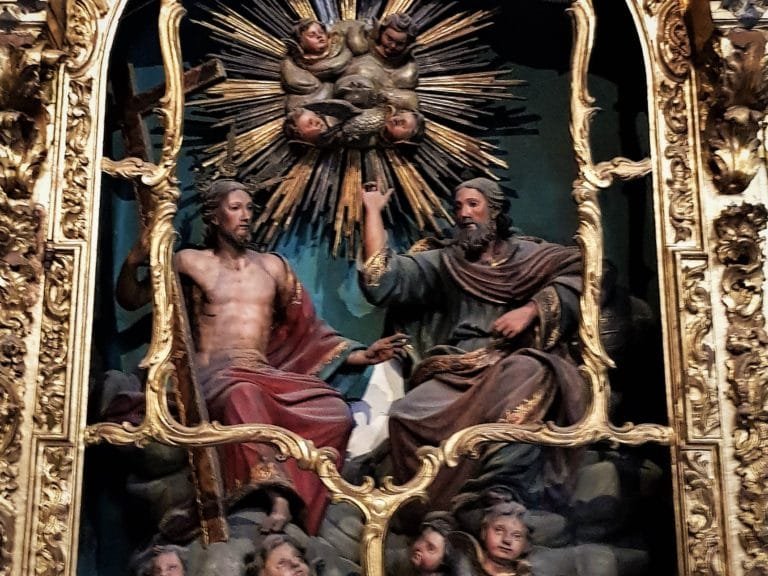POPE FRANCIS ON THE DIVINE MERCY SUNDAY B
POPE FRANCIS ON THE DIVINE MERCY SUNDAY 2021
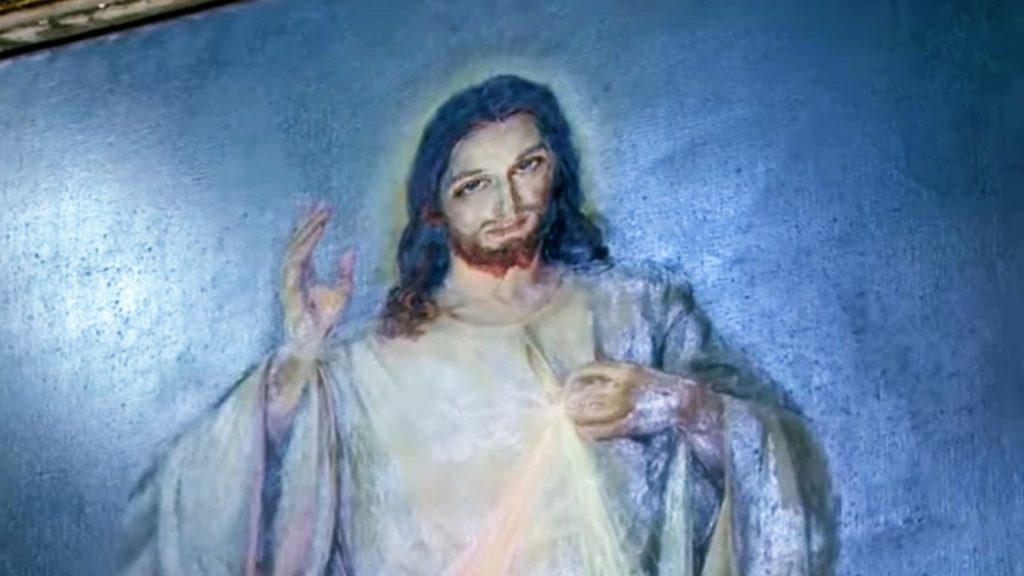
HOMILY OF HIS HOLINESS POPE FRANCIS
Church of Santo Spirito in Sassia
Second Sunday of Easter, 11 April 2021
The risen Jesus appeared to the disciples on several occasions. He patiently soothed their troubled hearts. Risen himself, he now brings about “the resurrection of the disciples”. He raises their spirits and their lives are changed. Earlier, the Lord’s words and his example had failed to change them. Now, at Easter, something new happens, and it happens in the light of mercy. Jesus raises them up with mercy. Having received that mercy, they become merciful in turn. It is hard to be merciful without the experience of having first received mercy.
First, they receive mercy through three gifts. First, Jesus offers them peace, then the Spirit and finally his wounds. The disciples were upset. They were locked away for fear, fear of being arrested and ending up like the Master. But they were not only huddled together in a room; they were also trapped in their own remorse. They had abandoned and denied Jesus. They felt helpless, discredited, good for nothing. Jesus arrives and says to them twice, “Peace be with you!” He does not bring a peace that removes the problems without, but one that infuses trust within. It is no outward peace, but peace of heart. He tells them “Peace be with you! As the Father has sent me, even so I send you” (Jn 20:21). It is as if to say, “I am sending you because I believe in you”. Those disheartened disciples were put at peace with themselves. The peace of Jesus made them pass from remorse to mission. The peace of Jesus awakens mission. It entails not ease and comfort, but the challenge to break out of ourselves. The peace of Jesus frees from the self-absorption that paralyzes; it shatters the bonds that keep the heart imprisoned. The disciples realized that they had been shown mercy: they realized that God did not condemn or demean them, but instead believed in them. God, in fact, believes in us even more than we believe in ourselves. “He loves us better than we love ourselves (cf. SAINT JOHN HENRY NEWMAN, Meditations and Devotions, III, 12, 2). As far as God is concerned, no one is useless, discredited or a castaway. Today Jesus also tells us, “Peace be with you! You are precious in my eyes. Peace be with you! You are important for me. Peace be with you! You have a mission. No one can take your place. You are irreplaceable. And I believe in you”.
Second, Jesus showed mercy to his disciples by granting them the Holy Spirit. He bestowed the Spirit for the forgiveness of sins (cf. vv. 22-23). The disciples were guilty; they had run away, they had abandoned the Master. Sin brings torment; evil has its price. Our sin, as the Psalmist says (cf. 51:5), is always before us. Of ourselves, we cannot remove it. Only God takes it away, only he by his mercy can make us emerge from the depths of our misery. Like those disciples, we need to let ourselves be forgiven, to ask heartfelt pardon of the Lord. We need to open our hearts to being forgiven. Forgiveness in the Holy Spirit is the Easter gift that enables our interior resurrection. Let us ask for the grace to accept that gift, to embrace the Sacrament of forgiveness. And to understand that Confession is not about ourselves and our sins, but about God and his mercy. Let us not confess to abase ourselves, but to be raised up. We, all of us, need this badly. Like little children who, whenever they fall, need to be picked up by their fathers, we need this. We too fall frequently. And the hand of our Father is ready to set us on our feet again and to make us keep walking. That sure and trustworthy hand is Confession. Confession is the sacrament that lifts us up; it does not leave us on the ground, weeping on the hard stones where we have fallen. Confession is the Sacrament of resurrection, pure mercy. All those who hear confessions ought to convey the sweetness of mercy. This is what confessors are meant to do: to convey the sweetness of the mercy of Jesus who forgives everything. God forgives everything.
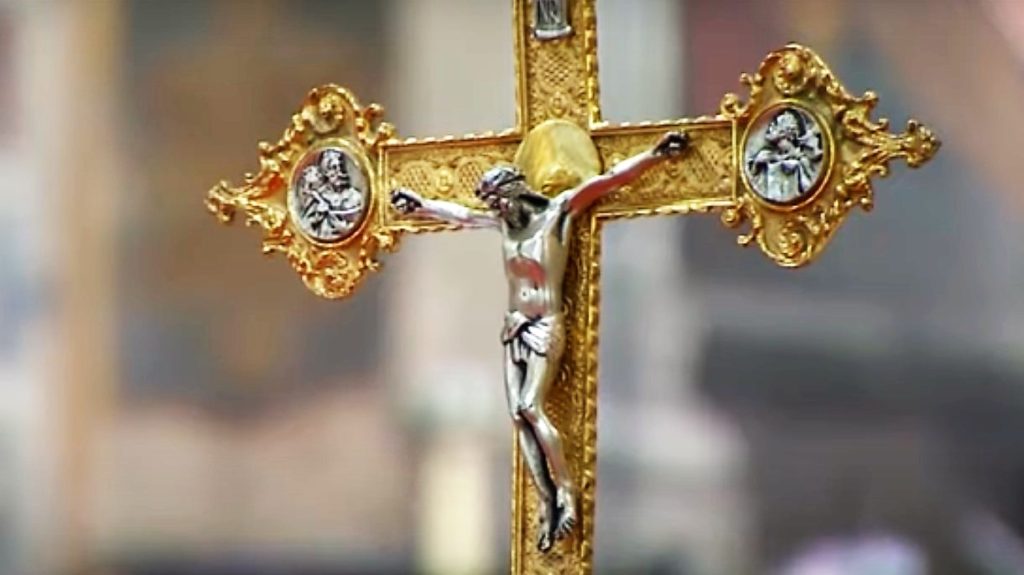
Together with the peace that rehabilitates us and the forgiveness that lifts us up, Jesus gave his disciples a third gift of mercy: he showed them his wounds. By those wounds we were healed (cf. 1 Pet 2:24; Is 53:5). But how can wounds heal us? By mercy. In those wounds, like Thomas, we can literally touch the fact that God has loved us to the end. He has made our wounds his own and borne our weaknesses in his own body. His wounds are open channels between him and us, shedding mercy upon our misery. His wounds are the pathways that God has opened up for us to enter into his tender love and actually “touch” who he is. Let us never again doubt his mercy. In adoring and kissing his wounds, we come to realize that in his tender love all our weaknesses are accepted. This happens at every Mass, where Jesus offers us his wounded and risen Body. We touch him and he touches our lives. He makes heaven come down to us. His radiant wounds dispel the darkness we carry within. Like Thomas, we discover God; we realize how close he is to us and we are moved to exclaim, “My Lord and my God!” (Jn 20:28). Everything comes from this, from the grace of receiving mercy. This is the starting-point of our Christian journey. But if we trust in our own abilities, in the efficiency of our structures and projects, we will not go far. Only if we accept the love of God, will we be able to offer something new to the world.
And that is what the disciples did: receiving mercy, they in turn became merciful. We see this in the first reading. The Acts of the Apostles relate that “no one claimed private ownership of any possessions, but everything they owned was held in common” (4:32). This is not communism, but pure Christianity. It is all the more surprising when we think that those were the same disciples who had earlier argued about prizes and rewards, and about who was the greatest among them (cf. Mt 10:37; Lk 22:24). Now they share everything; they are “of one heart and soul”” (Acts 4:32). How did they change like that? They now saw in others the same mercy that had changed their own lives. They discovered that they shared the mission, the forgiveness and the Body of Jesus, and so it seemed natural to share their earthly possessions. The text continues: “There was not a needy person among them” (v. 34). Their fears had been dispelled by touching the Lord’s wounds, and now they are unafraid to heal the wounds of those in need. Because there they see Jesus. Because Jesus is there, in the wounds of those in need.
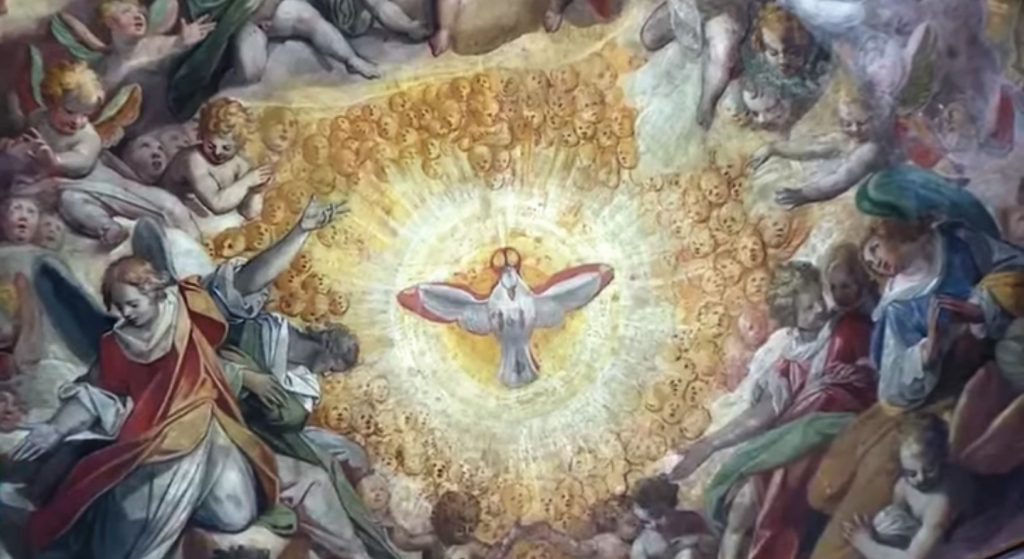
Dear sister, dear brother, do you want proof that God has touched your life? See if you can stoop to bind the wounds of others. Today is the day to ask, “Am I, who so often have received God’s peace, his mercy, merciful to others? Do I, who have so often been fed by the Body of Jesus, make any effort to relieve the hunger of the poor?” Let us not remain indifferent. Let us not live a one-way faith, a faith that receives but does not give, a faith that accepts the gift but does not give it in return. Having received mercy, let us now become merciful. For if love is only about us, faith becomes arid, barren and sentimental. Without others, faith becomes disembodied. Without works of mercy, it dies (cf. Jas 2:17). Dear brothers and sisters, let us be renewed by the peace, forgiveness and wounds of the merciful Jesus. Let us ask for the grace to become witnesses of mercy. Only in this way will our faith be alive and our lives unified. Only in this way will we proclaim the Gospel of God, which is the Gospel of mercy.
© Copyright – Libreria Editrice Vaticana
https://www.vatican.va/content/francesco/en/homilies/2021/documents/papa-francesco_20210411_omelia-divinamisericordia.html
EMPHASIS MINE.
Homily at Mass on Divine Mercy Sunday (April 8, 2018).

In today’s Gospel, we hear, over and over, the word “see”. The disciples rejoiced when they saw the Lord (Jn 20:20). They tell Thomas: “We have seen the Lord” (v. 25). But the Gospel does not describe how they saw him; it does not describe the risen Jesus. It simply mentions one detail: “He showed them his hands and his side” (v. 20). It is as if the Gospel wants to tell us that that is how the disciples recognized Jesus: through his wounds. The same thing happened to Thomas. He too wanted to see “the mark of the nails in his hands” (v. 25), and after seeing, he believed (v. 27).
Despite his lack of faith, we should be grateful to Thomas, because he was not content to hear from others that Jesus was alive, or merely to see him in the flesh. He wanted to see inside, to touch with his hand the Lord’s wounds, the signs of his love. The Gospel calls Thomas Didymus (v. 24), meaning the Twin, and in this, he is truly our twin brother. Because for us too, it isn’t enough to know that God exists. A God who is risen but remains distant does not fill our lives; an aloof God does not attract us, however just and holy he may be. No, we too need to “see God”, to touch him with our hands and to know that he is risen, and risen for us.
How can we see him? Like the disciples: through his wounds. Gazing upon those wounds, the disciples understood the depth of his love. They understood that he had forgiven them, even though some had denied him and abandoned him. To enter into Jesus’ wounds is to contemplate the boundless love flowing from his heart. This is the way. It is to realize that his heart beats for me, for you, for each one of us. Dear brothers and sisters, we can consider ourselves Christians, call ourselves Christians and speak about the many beautiful values of faith, but, like the disciples, we need to see Jesus by touching his love. Only thus can we go to the heart of the faith and, like the disciples, find peace and joy (cf. vv. 19-20) beyond all doubt.
Thomas, after seeing the Lord’s wounds, cried out: “My Lord and my God!” (v. 28). I would like to reflect on the adjective that Thomas repeats: my. It is a possessive adjective. When we think about it, it might seem inappropriate to use it of God. How can God be mine? How can I make the Almighty mine? The truth is, by saying my, we do not profane God, but honor his mercy. Because God wished to “become ours”. As in a love story, we tell him: “You became man for me, you died and rose for me and thus you are not only God; you are my God, you are my life. In you, I have found the love that I was looking for, and much more than I could ever have imagined”.
God takes no offense at being “ours” because love demands confidence, mercy demands trust. At the very beginning of the Ten Commandments, God said: “I am the Lord your God” (Ex 20:2), and reaffirmed: “I, the Lord your God am a jealous God” (v. 5). Here we see how God presents himself as a jealous lover who calls himself your God. From the depths of Thomas’s heart comes the reply: “My Lord and my God!” As today we enter, through Christ’s wounds, into the mystery of God, we come to realize that mercy is not simply one of his qualities among others, but the very beating of his heart. Then, like Thomas, we no longer live as disciples, uncertain, devout but wavering. We too fall in love with the Lord! We must not be afraid of these words: to fall in love with the Lord.
How can we savor this love? How can we touch today with our hand the mercy of Jesus? Again, the Gospel offers a clue, when it stresses that the very evening of Easter (cf. v. 19), soon after rising from the dead, Jesus begins by granting the Spirit for the forgiveness of sins. To experience love, we need to begin there: to let ourselves be forgiven. To let ourselves be forgiven. I ask myself, and each one of you: do I allow myself to be forgiven? To experience that love, we need to begin there. Do I allow myself to be forgiven? “But, Father, going to confession may seem difficult…”. Before God we are tempted to do what the disciples did in the Gospel: to barricade ourselves behind closed doors. They did it out of fear, yet we too can be afraid, ashamed to open our hearts and confess our sins. May the Lord grant us the grace to understand shame, to see it not as a closed door, but as the first step towards an encounter. When we feel ashamed, we should be grateful: this means that we do not accept evil, and that is good. Shame is a secret invitation of the soul that needs the Lord to overcome evil. The tragedy is when we are no longer ashamed of anything. Let us not be afraid to experience shame! Let us pass from shame to forgiveness! Do not be afraid to be ashamed! Do not be afraid.
But there is still one door that remains closed before the Lord’s forgiveness, the door of resignation. Resignation is always a closed door. The disciples experienced it at Easter when they recognized with disappointment how everything appeared to go back to what it had been before. They were still in Jerusalem, disheartened; the “Jesus chapter” of their lives seemed finished, and after having spent so much time with him, nothing had changed, they were resigned. We too might think: “I’ve been a Christian for all this time, but nothing has changed in me; I keep committing the same sins”. Then, in discouragement, we give up on mercy. But the Lord challenges us: “Don’t you believe that my mercy is greater than your misery? Are you a backslider? Then be a backslider in asking for mercy, and we will see who comes out on top”. In any event, – and anyone who is familiar with the sacrament of Reconciliation knows this – it isn’t true that everything remains the way it was. Every time we are forgiven, we are reassured and encouraged, because each time we experience more love, and more embraced by the Father. And when we fall again, precisely because we are loved, we experience even greater sorrow – a beneficial sorrow that slowly detaches us from sin. Then we discover that the power of life is to receive God’s forgiveness and to go forward from forgiveness to forgiveness. This is how life goes: from shame to shame, from forgiveness to forgiveness. This is the Christian life.
After the shame and resignation, there is another closed door. Sometimes it is even ironclad: our sin, the same sin. When I commit a grave sin, if I, in all honesty, do not want to forgive myself, why should God forgive me? This door, however, is only closed on one side, our own; but for God, no door is ever completely closed. As the Gospel tells us, he loves to enter precisely, as we heard, “through closed doors”, when every entrance seems barred. There God works his wonders. He never chooses to abandon us; we are the ones who keep him out. But when we make our confession, something unheard-of happens: we discover that the very sin that kept us apart from the Lord becomes the place where we encounter him. There the God who is wounded by love comes to meet our wounds. He makes our wretched wounds like his own glorious wounds. There is a transformation: my wretched wounds resemble his glorious wounds. Because he is mercy and works wonders in our wretchedness. Let us today, like Thomas, implore the grace to acknowledge our God: to find in his forgiveness our joy, and to find in his mercy our hope.
© Libreria Editrice Vaticana
EMPHASIS MINE.
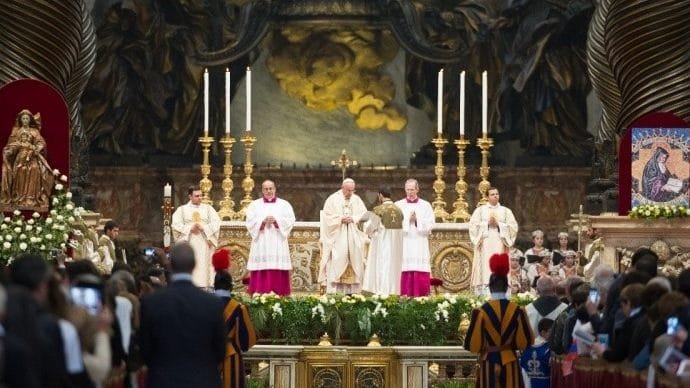
HOMILY OF HIS HOLINESS POPE FRANCIS
Vatican Basilica
Second Sunday of Easter (or Divine Mercy Sunday)
APRIL 12, 2015
Saint John, who was in the Upper Room with the other disciples on the evening of the first day after the Sabbath, tells us that Jesus came and stood among them, and said, “Peace be with you!” and he showed them his hands and his side (Jn 20:19-20); he showed them his wounds. And in this way they realized that it was not an apparition: it was truly him, the Lord, and they were filled with joy.
On the eighth day Jesus came once again into the Upper Room and showed his wounds to Thomas, so that he could touch them as he had wished to, in order to believe and thus become himself a witness to the Resurrection.
To us also, on this Sunday which Saint John Paul II wished to dedicate to Divine Mercy, the Lord shows us, through the Gospel, his wounds. They are wounds of mercy. It is true: the wounds of Jesus are wounds of mercy. “With his stripes we are healed” (Is 53:5).
Jesus invites us to behold these wounds, to touch them as Thomas did, to heal our lack of belief. Above all, he invites us to enter into the mystery of these wounds, which is the mystery of his merciful love.
Through these wounds, as in a light-filled opening, we can see the entire mystery of Christ and of God: his Passion, his earthly life – filled with compassion for the weak and the sick – his incarnation in the womb of Mary. And we can retrace the whole history of salvation: the prophecies – especially about the Servant of the Lord, the Psalms, the Law and the Covenant; to the liberation from Egypt, to the first Passover and to the blood of the slaughtered lambs; and again from the Patriarchs to Abraham, and then all the way back to Abel, whose blood cried out from the earth. All of this we can see in the wounds of Jesus, crucified and risen; with Mary, in her Magnificat, we can perceive that, “His mercy extends from generation to generation” (cf. Lk 1:50).
Faced with the tragic events of human history we can feel crushed at times, asking ourselves, “Why?”. Humanity’s evil can appear in the world like an abyss, a great void: empty of love, empty of goodness, empty of life. And so we ask: how can we fill this abyss? For us it is impossible; only God can fill this emptiness that evil brings to our hearts and to human history. It is Jesus, God made man, who died on the Cross and who fills the abyss of sin with the depth of his mercy.
Saint Bernard, in one of his commentaries on the Canticle of Canticles (Sermon 61, 3-5: Opera Omnia, 2, 150-151), reflects precisely on the mystery of the Lord’s wounds, using forceful and even bold expressions which we do well to repeat today. He says that “through these sacred wounds we can see the secret of [Christ’s] heart, the great mystery of love, the sincerity of his mercy with which he visited us from on high”.
Brothers and sisters, behold the way which God has opened for us to finally go out from our slavery to sin and death, and thus enter into the land of life and peace. Jesus, crucified and risen, is the way and his wounds are especially full of mercy.
The saints teach us that the world is changed beginning with the conversion of one’s own heart, and that this happens through the mercy of God. And so, whether faced with my own sins or the great tragedies of the world, “my conscience would be distressed, but it would not be in turmoil, for I would recall the wounds of the Lord: ‘he was wounded for our iniquities’ (Is 53:5). What sin is there so deadly that it cannot be pardoned by the death of Christ?” (ibid.).
Keeping our gaze on the wounds of the Risen Jesus, we can sing with the Church: “His love endures forever” (Ps 117:2); eternal is his mercy. And with these words impressed on our hearts, let us go forth along the paths of history, led by the hand of our Lord and Saviour, our life and our hope.
SOURCE: https://www.vatican.va/content/francesco/en/homilies/2015/documents/papa-francesco_20150412_omelia-fedeli-rito-armeno.html
EMPHASIS MINE.

REGINA CÆLI
Saint Peter’s Square
Second Sunday of Easter (or Divine Mercy Sunday), 12 April 2015
Dear Brothers and Sisters, Good morning!
Today is the eighth day after Easter, and the Gospel according to John documents for us the two appearances of the Risen Jesus to the Apostles gathered in the Upper Room, where on the evening of Easter Thomas was absent, and eight days later, he was present. The first time, the Lord showed them the wounds to his body, breathed on them and said: “As the Father has sent me, even so I send you” (Jn 20:21). He imparts his same mission, through the power of the Holy Spirit.
But that night Thomas, who did not want to believe what the others witnessed, was not there. “Unless I see in his hands the print of the nails, and place my finger in the mark of the nails, and place my hand in his side”, he said, “I will not believe” (cf. Jn 20:25). Eight days later — which is precisely today — Jesus returned to stand among them and turned immediately to Thomas, inviting him to touch the wounds in his hands and his side. He faced his incredulity so that, through the signs of the passion, he was able to reach the fullness of faith in the Paschal Mystery, namely faith in the Resurrection of Jesus.
Thomas was one who was not satisfied and seeks, intending to confirm himself, to have his own personal experience. After initial resistance and apprehension, in the end even he was able to believe, even though through effort, he came to believe. Jesus waited for him patiently and offered himself to the difficulties and uncertainty of the last to arrive. The Lord proclaimed “blessed”, those who believe without seeing (cf. v. 29) the first of which is Mary his Mother. He also met the needs of the doubting disciple: “Put your finger here, and see my hands…” (v. 27). In the redeeming contact with the wounds of the Risen One, Thomas showed his own wounds, his own injuries, his own lacerations, his own humiliation; in the print of the nails he found the decisive proof that he was loved, that he was expected, that he was understood. He found himself before the Messiah filled with kindness, mercy, tenderness. This was the Lord he was searching for, he, in the hidden depths of his being, for he had always known He was like this. And how many of us are searching deep in our heart to meet Jesus, just as He is: kind, merciful, tender! For we know, deep down, that He is like this. Having rediscovered personal contact with Christ who is amiable and mercifully patient, Thomas understood the profound significance of his Resurrection and, intimately transformed, he declared his full and total faith in Him exclaiming: “My Lord and my God!” (v. 28). Beautiful, Thomas’ expression is beautiful!
He was able to “touch” the Paschal Mystery which fully demonstrated God’s redeeming love (cf. Eph 2:4). All of us too are like Thomas: on this second Sunday of Easter we are called to contemplate, in the wounds of the Risen One, Divine Mercy, which overcomes all human limitations and shines on the darkness of evil and of sin. The upcoming Extraordinary Jubilee of Mercy will be an intense and extended time to welcome the immeasurable wealth of God’s love and mercy, the Bull of Indiction for which I promulgated yesterday evening here, in St Peter’s Basilica. That Bull begins with the words: “Misericordiae Vultus”: Jesus Christ is the face of the Father’s Mercy. Let us keep our gaze turned to Him, who always seeks us, waits for us, forgives us; so merciful, He is not afraid of our wretchedness. In his wounds He heals us and forgives all of our sins. May the Virgin Mother help us to be merciful with others as Jesus is with us.
SOURCE: https://www.vatican.va/content/francesco/en/angelus/2015/documents/papa-francesco_regina-coeli_20150412.html
EMPHASIS MINE.
SEE AS WELL:
2nd Sunday of Easter, DIVINE MERCY SUNDAY MASS PRAYERS AND READINGS YEAR B in https://catholicsstrivingforholiness.org/divine-mercy-sunday-year-b/
Stay updated: subscribe by email for free TO OUR NEW WEBSITE www.catholicsstrivingforholiness.org (PUT YOUR EMAIL IN THE SUBSCRIBE WIDGET).
We are also in www.fb.com/Catholicsstrivingforholiness. Kindly help more people in their Christian life by liking our page and inviting your family, friends and relatives to do so as well. Thanks in advance and God bless you and your loved ones! Fr. Rolly Arjonillo


